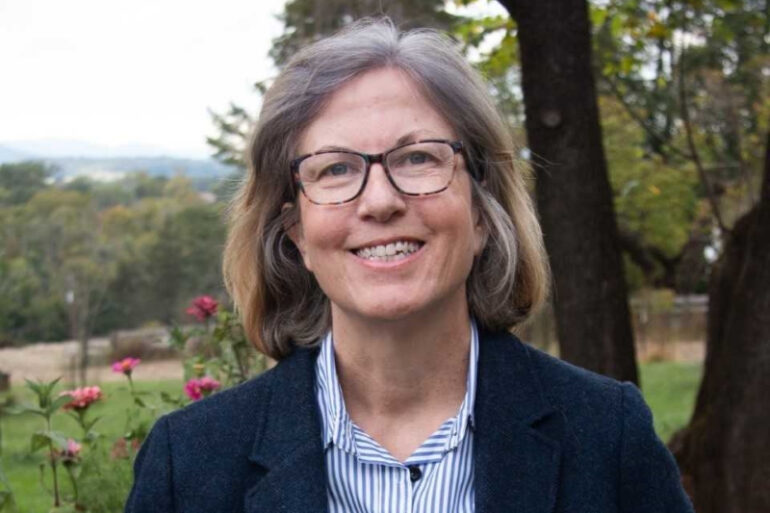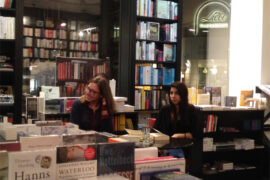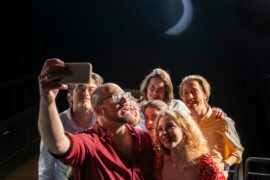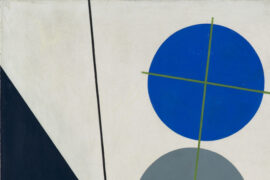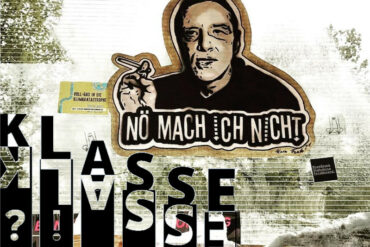Hilary Holladay digs into American poet Adrienne Rich’s life in her biography book The Power of Adrienne Rich, which was considered one of the best books of 2020 by the New York Times. An interview with Hilary Holladay about writing, Fourth wave feminism and powerful women.
Interview conducted by Seda Saygili
Photo: Adam Belmar
Hilary Holladay, a biographer, author, poet and scholar of modern and contemporary American literature, has written six books and edited two more. Her fiction book Tipton was a 2015 Virginia Literary Prize finalist. In 2014, American Hipster, her biography of Herbert Huncke, made the Lambda Literary Award finalist list. Holladay is also co-editor of a book of critical essays focusing on Jack Kerouac’s On the Road and worked as an English professor at the University of Massachusetts in Lowell. Her latest book is the biography of an American poet and feminist: Adrienne Rich. The Power of Adrienne Rich received reviews from the New York Times and many other magazines. It was also listed as one of the top books of 2020 by the New York Times.
Litlog: How did you come up with the idea to write biographies about writers such as Adrienne Rich?
Hilary Holladay: Well, I’ve always really liked contemporary American literature. I’ve liked exploring the lives and the art of writers of my own time. Usually, there hasn’t been that much written about them yet. So it’s an open roadway. The writers I’ve chosen to research and publish on typically have been outsiders in one way or another. Herbert Huncke was a member of the Beat literature movement and not particularly well known, but I think he’s an interesting writer. Due to discrimination, Lucille Clifton as a Black female poet had not received much scholarly attention. Adrienne Rich certainly was popular during her lifetime, but people’s memories are short. So I thought: I want to make sure people remember her.
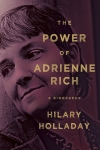
Hilary Holladay
The Power of Adrienne Rich
PenguinRandomHouse: New York 2020
496 pages, $32.50
Litlog: How was the writing process of The Power of Adrienne Rich? After speaking with many different people from her life, how did you maintain your objectivity?
Holladay: I loved writing the book. As a scholar, you learn when your own opinion is creeping in too much. If you start to feel that your feelings are getting too involved, it’s important to step back. I also drew on my background in journalism there. I read Rich’s work, so I had that version of her life story as sort of a backbone. Then I began contacting as many people as I could to interview them either by phone, by email or sometimes in person. For example, I flew out to California and met her sister Cynthia. Cynthia was estranged from Adrienne, but still wanted the book to be very fair. She didn’t want me to over-criticize her sister so there were occasions when she would pull me back and urge me to re-centre my approach. I also didn’t want to just compliment Adrienne Rich and say how great she was because that’s not interesting to read. I felt that by talking to so many people, I could synthesize the knowledge and come up with as close to a fully accurate version of her life story as possible. Some people knew about just one part of her life, what she was like as a college student, or what she was like as a child. Others knew her when she was already famous and when she was really powerful in the women’s movement.
Litlog: Let’s also discuss the book’s title, The Power of Adrienne Rich. What is so powerful about her?
Holladay: I didn’t come up with the title until I was nearly finished with the book. At first, I had planned to use a phrase from a poem of hers: »Waking in the Dark«. But I was never quite satisfied with that. I felt like it might have made her sound kind of naïve. Again and again, the notion of power came up in her writing and in the conversations, I had with feminists who were friends with Rich. They would tell me that even though they were friends with her, they were somewhat afraid of her because she had so much power. If she got mad it was really upsetting to be the object of her wrath. It made me think about how power has so many different levels and so many different dimensions: her power as a writer, her power as a feminist, her intellectual power.
Litlog: Speaking of feminism in 2022, we’re in the so-called the Fourth Wave. Today’s activists use hashtags, Instagram posts and tweets to spread their messages. The Fourth Wave of feminism is said to begin in 2012, the year Adrienne Rich died. So it begins after her. What role does Rich’s political poetry play in relation to her involvement in these movements?
Holladay: That’s interesting that the Fourth Wave is connected to 2012. I didn’t know that. I think it’s actually very difficult to take a poet like Adrienne Rich and place her in the hashtag world. You do see Rich’s name and quotes from her poems and essays come up often on social media. In her later years, she did an interview in which she was asked about technology and whether she liked it. And she said she was fine with it. She was flexible and versatile, so she rolled with the changes in technology. But the problem is: We have the world of social media, which is pretty shallow, let’s say horizontal, and you have Rich, a deep, thought-provoking, more vertical poet, whose work requires a significant investment of a reader’s time. It’s obvious that the internet world is a work in progress, and it’s changing every second. How do we figure out the way to go deep into activism and literary activism online? I haven’t figured it out, and I think we’re all open to suggestions.
Litlog: Talking about modern feminism, it seems nothing really progresses or rather, we’re regressing, for example, with the overturning of Roe vs. Wade. Doesn’t that make Rich’s work as a Second Wave feminist all the more relevant today?
Holladay: Adrienne Rich and her generation of feminists were trying so hard to get everybody to wake up to how important it is for women to have control over their own bodies. If Rich were alive now, she would be so saddened and furious that Roe vs. Wade was overturned. That’s why I think it’s important for young scholars to write about Rich and other feminist authors making arguments that are entirely relevant today. It’s important to keep teaching these authors—who are not from the distant past—and building on the insights that they offer us. When Rich herself was teaching at Stanford University, she wanted her students to know how feminism got started and how it developed in the 1960s and 1970s. Now we need to keep Rich’s work and the work of her colleagues alive. We don’t want to lose sight of these thinkers who have already come up with possible solutions and have already identified the key problems that we’re dealing with. Because otherwise, we just keep revisiting the same troubles and problems. The overturning of Roe vs. Wade is just heart-breaking and really terrible after all the work that those feminists did on behalf of women’s rights. It just shows that what they were fighting against, the misogyny, is still with us. It has not gone away, and in some ways, it has become more blatant. It’s unfortunate, but it’s the reality of our world.
Litlog: Adrienne Rich refers to certain well-known and lesser-known female figures in history in some of her poetry, for example, Marie Curie, Audre Lorde or Caroline Herschel, an astronomer. When we read them, these poems are about these successful women but also very much about Adrienne Rich herself and all of us, all the women around the world. What do you make of this strategy?
Holladay: That’s an interesting question. I think that dedicating a poem to another woman shows that this other woman is important. She’s writing to that other woman as an equal in a culture that tends to still value men higher than women. A dedicated poem really sends a message to all of us, not just to that person. It’s a political act. Rich observed that men often write poems to and about women, even though they may have little understanding of women’s interior lives. She didn’t see very many women poets closing the gap by writing poems about women, so she took on that task for herself. When she wrote poems about female scientists, artists, and other historical figures, she was memorializing their significance as thinkers, creators, and individuals who suffered, not just love objects.
By extension, she was asserting her own value as a thinking, creating, suffering woman. She often saw something of herself in the women she wrote about, and that comes out in the ambiguity of the language she uses in her poems about these women. As for Audre Lorde, her friend and fellow poet, a Black woman, and a lesbian like Rich herself, Rich loved and admired her. Lorde was such a smart outspoken woman, and they were very close, but they would also spar with each other. Neither one was afraid of arguing. In some of their poems, you can see Rich and Lorde in dialogue with each other. Rich pushed Lorde to become more disciplined in her argumentation and her crafting of poems, and Lorde pushed Rich to step outside her world of White privilege and better understand the complexity of race relations.
Litlog: You also write poetry. Which genre is your favourite?
Holladay: I have worked in a variety of genres and enjoyed all of them. I did a lot of academic writing early in my career. I have been a newspaper reporter, I have written poetry, and I have written fiction. I like being versatile. I guess I have sort of a restless mind, and I like being able to move back and forth between genres. When I think about how I would describe myself now in certain situations, it’s logical to say I’m a biographer because the Rich book has been the most recent. But I think of myself broadly as a writer open to all genres. I don’t think there’s anything wrong with having lots of different ways to think of oneself. There’s no reason to have just a single label for your writing career. But to answer your question, poetry is my favourite.
Litlog: What is your favourite book that you have written so far, and what do you hope to accomplish as a writer in the future?
Holladay: I would say that The Power of Adrienne Rich is my favourite. I know how hard I worked on it, and I know that I did my absolute best with it. It was challenging to write because Rich herself was a complex, ever-evolving, fascinating character—her complexity also made her a wonderful, mesmerizing subject. I never grew tired of thinking about her as I worked on the book. Now I would like to write another nonfiction book—topic not fully decided yet—and go back to my own poetry. Do you write poetry?
Litlog: Yes, I do. I try to! Where do you find inspiration for creating fiction as well as poetry?
Holladay: I guess it varies from writer to writer. We’re all preoccupied with so many things that we just need to get through the day or the week. But if I slow down and take time to write in my journal, that can be useful for poetry. Also, it is very important to read broadly and to read great fiction, poetry, and drama by both women and men and by writers from around the world. If I’m reading Franz Kafka or Virginia Woolf or Emily Dickinson or Richard Wright, or James Joyce, then I’m learning about human nature and the idiosyncracies of human perception, which are at the heart of all good poems.
Also, I think stepping away from the news and social media can be very useful. Think your own thoughts. What do see when you walk around your neighbourhood? What do you hear and smell? What do you love about the physical world you live in? What would you like future generations to know about the world you live in, for good or ill? Think about it and put it down on paper. We’re all writing for the people around us and for posterity, just like Adrienne Rich was. To do justice to our readers, whoever and wherever they are, we need to find ways to be courageous and realistic, the way Rich was, and write with as much insight, honesty, and dignity as we can muster.
Litlog: Adrienne Rich once said that her poetry is not propaganda even if it’s about politics. What do you think about it? How can political messages be conveyed in a metaphorical, poetic way instead of being too explicit?
Holladay: Rich worked diligently to achieve what you just described. She did not want to write poems in the 1960s and 1970s that were narrowly about the Vietnam War, for instance. But how does one avoid getting mired in topical details that lose their significance over time? I think the best way to avoid writing poems that feel ripped from the newspaper headlines is to take notes, do some reading on the broader concerns of the situation you plan to write about, and do some deep reflecting. You may end up writing a poem that touches only tangentially on the political matter that first drew your attention. Or you may decide that, in fact, you do want to write a poem rooted in the moment that does have some propaganda in it. You can experiment. Over time, you will learn what works for you, and you can always try different approaches.
Litlog: How do readers’ reactions encourage or discourage you?
Holladay: I was very happy that the book got some good reviews in major publications. It didn’t really matter what they said. What mattered to me was that they thought the book deserved a review. There are so many good books that are published that don’t get reviewed. There are fewer newspapers here in the U.S. than there used to be and there are fewer newspapers that dedicate space to reviews. So just the fact that it got reviewed made me happy, because I wanted the book to have as many readers as possible. I’ve enjoyed it when people have contacted me directly to tell me they liked the book and learned from it, or to share an anecdote about Rich, if they knew her.
Litlog: What would you recommend to young aspiring writers?
Holladay: Just dive in! One of the good things about the internet is that you can get your thoughts out and share your writings very widely. But if you have something that you’ve worked on that you feel good about, it’s great to get it published in an online journal. That way you start building a reputation early. I’d also say that for young people who love literature it’s fun and challenging to write book reviews so you can decide what you want to write about because book companies and book publishers are so eager for books to be reviewed. You can start a career as a book reviewer while you’re still in school. And book reviews are important. Because people live very busy lives and maybe your review will cause someone to pick up a book they wouldn’t have otherwise. So, I think it’s hard to write a good book review but it’s worth trying.


